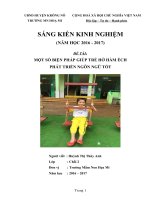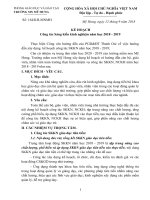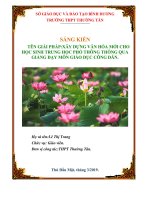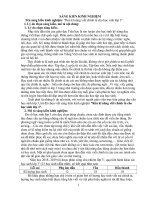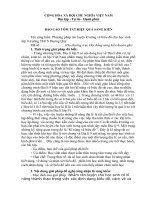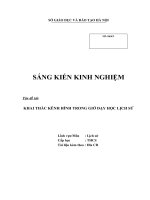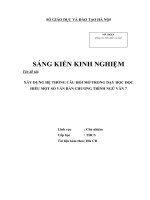SÁNG KIẾN KINH NGHIỆM NĂM HỌC 2017 - 2018
Bạn đang xem bản rút gọn của tài liệu. Xem và tải ngay bản đầy đủ của tài liệu tại đây (5.49 MB, 27 trang )
1: PREAMBLE.
1.1. The reasons of choosing the topic:
Nowadays with the trend of development and economic integration
between the countries in the region and the world, the use of English in
communication has become extremely popular and important. In recent
years, English has been taught in most schools as an elective subject. Yet,
it is the basis, the premise for children to learn these subjects well in
secondary school and higher levels.
The teaching and learning of English is increasingly innovation to fit
the current situation. It is increasingly high demands not only on the level
but also the teaching methods of the teachers of this subject.
English books for elementary students have been compiled
scientifically, consistently with psychological characteristics of small
students. In the lessons that integrate the operations and introduce new
language development skills (listening, speaking, reading and writing) in
simple level followed by themes close to their real life as You and me, my
school, my family, and the world around you.
If the teachers want their primary school students to study English
better , they should not teach and explain according to the availabe
documents in textbooks, they have to find out new methods to sastify the
requirement of renovation and help students study actively.
In the process of learning English, remember vocabulary to learn
and communicate is necessary. Without vocabulary, students can not
learn and communicate. Because of the reasons above, I choose the topic
"Innovating method of teaching vocabulary to help the third grade
students in Thieu Long primary school study and remember words
effectively"
1.2. Research purposes.
+ Myself take the time to explore, research, reference literature,
grammar, exercises improve and collectibles exam gifted students of the
district, city, province, country ... every year then I recorded and
accumulated frequent.
1
+ Themselves regularly exchange with colleagues inside and outside
teaching hours to learn and draw on experience necessary to apply
during training.
+ School board methodical, professional level high interest always
rubbing back and deep motivation to work properly fostering good
student.
+ A good number of gifted students polite, diligent, conscious
learning, motivation to learn and the ability to acquire all good.
+ Some parents were concerned about the education of their
children should regularly meet and talk with the teacher about the child's
learning and meet all of the documents that teachers require.
+ Thieu Long Primary School is a school in a rural area, the
document reference books for the library in English is limited. Therefore,
there is not enough material to students and teacher reference, research
comfortably, easily.
+ Due to the characteristics of the local majority should parents
are working away to leave their children at home with grandparents.
The collaboration between parents and teachers is limited. Most parents
are farmers so the awareness is still low and the economy of fathers only
economic worry no time care, tutoring, rubbing back and urge their
studies students should source well quite limited.
+ Most families have no computer connected to the Internet.
+ Parents and students are "overlooked" in English.
+ Students have not focused on English language because it is
elective courses.
+ Students are not sufficiently material to foster self-learning and
more.
+ Time training for gifted students is limited.
+ Business fostering good student now limited.
For the quality of their courses to achieve the best results it is not
an easy thing. So how do they form and develop learning skills most
comprehensive? How do I love them, inculcate knowledge of foreign
cultures? In any way to help students understand that not all solid boring,
2
to truly charismatic, playful atmosphere in class comfort, inspire students
to absorb foreign culture that they themselves unknown.
At present, English is a new and difficult subject in elementary
school, most students and parents are not really interested. Vocabulary is
an important and indispensable factor in language used for
communicative activity. So, mastering numbers vocabulary is necessary.
In English we can not develop the skills such as: Listening,
spkeaking, reading and writing without literacy vocabulary.
1.3. Research subjects:
"Innovating method of teaching vocabulary to help students in
Thieu Long primary school study and remember words effectively"
- Students of grade 3, class 3A of Thieu Long primary school.
1.4. Method of research:
To research a topic, people often choose many different methods.
With this topic, I use the following methods:
1 / Theoretical research method
I read the conducting material issues related to my research needs.
2. Learning experience from my colleagues
Attend the colleagues’ lesson to follow their good method.
3. Experimental matching method.
4. Observation method.
5. Visual method and oral method.
1.5. New points of experience initiative.
Methods of teaching English has been a lot of talking and
discussion. Learn how to best? Teach how to truly quality and efficiency?
That's what concerns the concern myself but every teacher of English. A
normal classroom lessons also need to prepare carefully can teach good
and effective.
2. CONTENTS INNOVATION.
2.1. Reasoning Base
When teaching foreign languages in general and in particular of
English, teachers have to impart students to recognize the smallest and
the first factors to be established a language, it is the word.
3
Teachers themselves always want their students to remember as many
words as possible so that they can drill other skills well. But the majority
of primary school children are afraid of memorizing vocabulary as they
not only requires perseverance, hard working but also time-consuming.
Memorizing vocabulary is not merely to memorize how to read, how to
write, but also to remember the semantics and usage as well. So, how to
get students interested in this job? It requires teachers to have the
teaching methods and testing vocabulary techniques that suit students
and the procedure must be always diversify and flexibility. With primary
pupils who get their first exposure to English, unavoidable initial
difficulties such as: how to write and how to read. In grade 4, students
have to learn and memorize more words, more difficulties in reading and
writing, longer structures, so students are afraid of learning vocabulary.
So creating the students’ learning habits is extremely important and
teachers should be top priority.
2. 2. Practical basis:
- Any languages in the world, to communicate, it requires us to have
a large amount of vocabulary. Because vocabulary is an indispensable
component in the language used for communication activities. Thus,
master the number of learned words to use is very important.
- In English, we can not train and develop the four skills of listening,
speaking, reading and writing of students without being based on the
foundation of vocabulary. Indeed, if there is no necessary word, students
can not listen, speak, read and write well, even if they have mastered
structures.
2. 3. Situations.
- Following the current distribution programs, there are two lessons
per week for English in primary schools, and there are new words in
almost lessons. To teach vocabulary well, lessons must be more vivid and
teachers have to make pictures, maps for illustration, enabling students to
easily remember words and draw attention to their subject or focus on
lessons.
4
- For the students, besides a number of children who study actively,
there are many students learn only to cope with their teachers. They can
not remember the words for a long time and use the words effectively.
-There have been many difficulties for teacher of English because
students can not be helped to study at home by their parents.
Also, the ways students learn vocabulary is also need to be
concerned, students often learn vocabulary by reading words in English
and try to remember that in Vietnamese, they write in their notebooks is
just to the deal with their teachers, not self-consciously check, to inculcate
new words . Therefore, they are forgetful and easily confused these words
with other words. As a result, many students get bored and forget the
words. So teachers need to pay attention to this mentality of students.
2. 4. Problems before applying the experience initiative
After analyzing the causes that make students afraid of learning
English, not remember and use vocabulary ineffectively, I take a small
survey. Specifically, in the beginning of the school year, I have taught
English for class 3A, after some lessons, I asked students to do a
vocabulary test by asking them to match English words with Vietnamese
meaning (Matching):
Match English words with Vietnamese meaning
Classroom
Thư viện
Library
To, lớn
Big
Phòng học
Book
Phòng âm nhạc
Music room
Ngắn
Short
Quyển sách
Translate the following words into Vietnamese.
What: …………
My: ………………
Your: ……………
This: ……………….
Friend: ……………….
Translate the following words into English.
Cục tấy ………………
Cái bút chì …………………
5
Hộp đựng bút chì ……………
Cái thước ……………….
Cặp học sinh ………………………..
* Quality research topic before.
Total Matching
Translate into
Translate into English
Vietnamese
29
20
15
10
With that result, I have decided to try to apply some of the
experience of teaching vocabulary throughout some years I have been
teaching in primary school to compare with the first result.
Standing in front of the weaknesses of most students not only as a
teacher of the English department but also most district school teachers
feel very embarrassing.
2. 5. Innovations or solutions used to solve the problem.
2. 5. 1: Some techniques to help students learn and remember
vocabulary:
2.5.1. a. Introducing new words
The first stage in teaching vocabulary is the introduction. Introduce new
words plays a very important role in an English class. It can help students
understand the contents of the lessons, grasp the meaning of the word,
using through the initial introduction of the teacher. Normally to
introduce a new word, teachers typically perform the following steps:
1. Elicit new words by pictures, real objects, examples, situations and so
on…
2. Present new words in English
3. Have students listen 3 times.
4. Students repeat the new words (2-3 times in chorus)
5. Student repeats individually (2-3 students)
6. Teacher present words on the board
7. Check words in Vietnamese
8. Check the word stress
9. When finished teaching all new words, students write in their
notebooks.
6
However, not all the new words that appear in the lessons for
students are also included in the introduction of new words. The teachers
have to choose active words in order to help student study well. Besides,
teachers have to know arranging the words in a logical sequence, or
create presentation following thematic lessons.
In the process of preparing, all teachers must choose suitable skills
and techniques, carefully prepare for the elicitation, select the objects
related to the introduction and the way of checking to cause students’
excitement. In the process of introducing vocabulary, there are some
mistakes need to be avoided:
- Do not introduce too many new words in a lesson (only about 6-8
words)
- Do not ignore the word stress
- Avoid writing new words on the board immediately without narration.
- Pass checking words.
In primary schools, to deal with new material is mainly about
grammar and vocabulary. Grammar and vocabulary always have positive
relationship with each other, have been taught to clarify the meaning.
However, teaching and introducing vocabulary is specific problem.
Normally, new words always appear in a lesson, but not all new words
have been taught. To select from the words to teach, teachers should
consider these problems:
- Active vocabulary
- Passive vocabulary
We all know how to teach these two different types of words. Active
words are involved in the four skills (listening - speaking - reading writing). For this kind of words, teachers should invest time to introduce
and have students practice more.
With passive words, teacher just stop at getting students to know,
do not need to invest time for them. Teachers need to know the options
and decide what will be taught as active words and passive words as well.
Besides, when teaching new words, teachers should clarify the basic
elements of the language such as:
+ Form
7
+ Meaning
It is not enough if teachers only show letters and meaning for
students. They should be taught the stress and the use of the words in real
situation too.
The number of words should be taught depends on the content of
the lesson and level of the students. Never teach all the new words, or we
will not have enough time to perform other activities. However, in a class
we should teach a maximum of 6 words
- While selecting words to teach, teachers should consider two following
conditions:
+ Are the words needed to understand the text?
+ Are they difficult for students?
If the word is needed to understand the text and match the level of
the students, then it belongs to the group of active, so you have to teach
students.
If the word is needed to understand the text but difficult for
students, it does not belong positive group, so teachers should explain it
to the students, just for them to understand the meaning.
If the word is not necessary to understand the text and also not
very difficult, you should ask students to guess.
2.5.1. b The techniques for eliciting new words:
- Teachers can apply some techniques to introduce new words such
as:
b. 1. Visual: Have students look at pictures, and guess the meaning.
e.g. a wardrobe.
a flower
8
Playing badminton
skipping
Playing volleyball
playing football
School
gym
Classroom
bedroom
b. 2. Mine: Expressed through facial expressions, gestures.
e. g: bored
e. g: (to) jump
Teacher looks at watch, makes
T. jumps
bored face, yawns
T. asks: “What am I doing?”
T. asks: “How do I feel?”
b. 3. Realia: Use real objects to introduce the new words:
e.g.
cakes
(count),
rice e.g. open (adj.), closed (adj.)
(uncountable)
T. opens and closes the door
T. brings real cakes and rice into
T. says, “Tell me about the door:
the class.
it’s..........what?”
9
T. asks, “What’s this?”
b.4. Situation / explanation:
e.g. honest
T. explains, “I don’t tell lies. I don’t cheat in the exams. I tell the
truth.”
T. asks, “What am I? Tell me the word in Vietnamese.”
b. 5. Example:
e.g. furniture
e.g. (to) complain
T. lists examples of furniture:
T. says, “This room is too noisy
“tables, chairs, beds – these are
and too small. It’s not good
all ... furniture ... Give me another
(etc.)”
example of... furniture...”
T. asks, “What am I doing?”
b. 6. Synonym \ antonym:
Teachers use vocabulary that student have learned to explain
synonyms or antonyms.
e.g. intelligent
e.g. small
T. asks, “What’s another word for
T. asks, “What’s the opposite of
clever?”
big”
b. 7. Translation
Teachers use the word equivalent in Vietnamese meaning to explain
in English. Teachers only use this procedure when there is no other way,
this procedure is often used to teach abstract nouns, or to solve a large
amount of word with short time, the teachers suggest and students
translate themselves.
e.g. (to) forget
T. asks, “How do you say “quên” in English?”
b. 8. T’s eliciting questions:
To introduce new words, teachers teach students with four skills of
listening - speaking - reading and writing.
+ Listening: Teachers model reading, students listen.
+ Talking: Teachers read the words, students repeat.
+ Reading: Teacher writes words on the board, students look at the
words and read.
+ Writing: Students write words into their notebook
10
While teaching new words, teacher should keep in mind the
following points: should introduce the words, in different communicative
situations, should combine work by establishing the relationship between
old and new words, vocabulary must be constantly reinforced.
To help students study well, it requires teachers to choose suitable
methods, shortest and fastest way should be chosen. So students apply the
words in practical situations.
2.5. 2 The measures to practice
2.5. a. The steps to introduce new words:
Introduce lesson, introduce topics: this is an important step in
teaching vocabulary. This step will determine the success of the lesson, it
will inspire students to think of what they are going to learn through all
the newly introduced point.
The most important thing in introducing new words is to comply
with the order: listening, speaking, reading and writing. Never start other
activities except "hear". Remember the learning process of our mother
tongue, always start by listening, imitating pronunciation and then to the
other activities. Please help your students have the best learning
vocabulary habit:
- Step 1: "hear": Have students listen to your reading or to the tape
script.
- Step 2: "say": after listening three times, ask the students to
repeat chorally then individually.
- Step 3: "read": Write the word on the board and ask students to
look at it and read aloud. Have students read in chorus, then in individual.
- Step 4: "write", after students read the words correctly, ask them
to write new words in their notebook.
- Step 5: Ask students to guess the meaning of the word.
- Step 6: Note students words stress
- Step 7: Give sample sentences and ask students to pay attention.
Then drill the structure by substitution.
To help students learn vocabulary well, techniques for checking and
reinforcing vocabulary are as important as techniques for introducing
11
them. These are some techniques for checking and reinforcing
vocabulary:
2.5. 2 b. Techniques for checking and reinforcing vocabulary:
Techniques for checking and reinforcing vocabulary will encourage
students learning more positively and effectively.
I would like to mention to some of them:
+ Rub out and remember
+ Networks
+ Slap the board
+ Word square
+ What and where
+ Brainstorming
+ Jumbled words
+ Bingo
+ Lucky number
+ Crosswords
+ Hangman/ Shark attact
+ Matching
+ Noughts and crosses
……………..
I often apply some following techniques and recognize that students
are very interested.
b.1- Hangman , Shark attact :
- I suggest some letters of the word need to be guessed by some short
bricks on the board.
Example: Farmer (------): each dash represents a letter
- Ask students to guess the letters in words. (Read the letters according
to English alphabet)
- If they guess incorrectly, teacher draws a dash (in the order of showing
"Hangman"), or down a step "Shark attact"
*Hangman
*Shark attact
Figure 1
- Students who guess incorrectly 8 times, (will be hanged), 3 or 4 times
wrong guess will fall into shark mouth( eaten by shark ), then the
teachers give the answer. Similar steps are used for the other words.
12
Through this game I've been checking students’ writing and also
revise the English alphabet.
b.2- Slap the board :
- Write some words into the circles on the board.
- Have students play game by slapping the correct word in the circle after
listening to the teacher’s words.Students play game in groups.Students
who slap most words correctly and the fastest will be winner.
b. 3- Rub out and remember
- Write new words or stick the pictures on the board, ask student to look
and remember all of them in 30 seconds.
- Rub out words by words and have student read the word without letters
on the board. Then ask them to write the words again on the board.
For example:
-After writing the words, have students read aloud in chorus to help
them revise the way of reading vocabulary.
b.4- Matching:
13
It may be matching words in column A with their meaning in column B or
words in column A with words in column B to make phrase of v
Have one student macth and one check. Then get all students to read in
chorus loudly.
b.5- Bingo :
- Teacher prepares 9 words or 9 numbers.
-Ask student to draw a table with 9 squares.
- Students write any 9 words or numbers in those squares
- Teacher read aloud prepared words/ numbers.
-Student listen and tick the words/numbers that teacher has just read.
- Students who have 3 squares in line, in horizontal or cross say aloud
“Bingo” first will be the winner.
14
b.6 - Jumbled letters:
- Write some words with wrong order on the board.
- Students play game in groups.
- One representative from each group comes to the board to write the
correct words.
- The group with the most correct words will be the winner.
- The group with the most correct words will be the winner.
b. 7. Lucky numbers
- Class is divided into 2 groups.
- Teacher prepares some questions and numbers them. (Include 3 or 4
lucky numbers).
E.g:3, 6, 8
1
6
2
7
3
8
4
9
5
10
- If students choose lucky number they will not have to answer the
question and get 2 points.
- Each other number is a question or a requirement with 2 points if
students answer correctly.
- If one group answers incorrectly, the other one continues
- When all the numbers selected, the group with more points will be the
winner
15
b. 8. Crosswords
- Draw a table with squares on the board.
- Give students topic and number of the words in squares.
- Students play game in groups.
- One representative from each group goes to the board to circle the
correct words.
- The group with the most correct words will be the winner.
1=>
2=>
3=>
5=>
<=6
<=4
7=>
<=8
9=>
b.9 - Brainstorming, Networks:
- Write the topic of the vocabulary on the board.
- Divide class into 2 groups and ask students to prepare in 2 minutes to
list the words involved.
- One representative from each group comes to the board to write the
correct words.
16
- The group with the most correct words and the fastest will be the
winner.
2. 6: Guide students to learn vocabulary at home:
To bring into play students’ positive and creative initiative in learning ,
then we need to organize the teaching process in a positive way to the
activities of the students , the teaching and learning process , teachers are
only the transmission of knowledge to students, students who want to
acquire the knowledge, have to learn on their own .
Further, it is short time at school for students, and most of the time
remaining at home must be held for their own learning activities. Then
surely the teaching and learning activities will be increasingly more
complete.
So at the beginning of the school year, teachers should guide students
build learning activities at home:
a. Prepare vocabulary.
b. Learn vocabulary by heart
2. 7. The effectiveness of experience initiatives for educational
activities, with self, colleagues and the school
Through practical application of innovative experiences in schools
has brought a markedly positive results. Teachers participate actively
fostering the bold, the awkward and unusual problems as before when no
applicable experience initiatives. Applying innovative experience shorten
the training time while maintaining the knowledge and skills necessary
for them to take the exam students. Particularly interested students
actively learn, explore newer knowledge. Although the results of
students of all levels achieve very high yet, but this is the premise to help
me continue to study and further improvement in the method of fostering
students in the next academic year.
After the implementation of the initiative, the students experience a
positive, proactive learning, eager to participate in the contest, district,
provincial and national level are organized in the last school year. They
are
confident and optimistic in their ability to do all.
2. 8: Results:
17
After applying "Innovating method of teaching vocabulary to
help the third grade students in Thieu Long primary school study and
remember words effectively" students’ learning result has been
increased significantly. Most of them are interested in learning and
reading English with the following result:
This is the resul of tests of 29 students of class 3A.
Tota Matching
Translate
into Translate into English
l
Vietnamese
29
25/29
21/29
17/29
Tests
Good
Fairly good Medium
Weak
Survey
5
8
16
0
Test 1
5
8
15
1
Test 2
5
10
14
0
Through these tests, my students have achieved significant results.
The best results are exciting atmosphere in classroom, students
understand their lesson. Students communicate confidently and the study
result is improved significantly. In the academic year 2017 - 2018 I have
applied "Innovating method of teaching vocabulary to help the third
grade students in Thieu Long primary school study and remember
words effectively" results indicate academic quality significantly. Number
of gifted students increases. Most students have a more keen in learning
English because students are using English to communicate with teachers
and friends in the classroom as well as in volume. So I see the use of
innovative approaches Grade 3 English program is positive and
contributes to improving the quality of teaching myself and colleagues.
3. CONCLUSION AND SUGGESTIONS
3.1. General conclusion
Using techniques to teach and test vocabulary helps students
remember vocabulary more easily, and get more interested in the subject.
Each game helps children focus on learning and communicate better. Then
helps them study actively.
Each game is an opportunity for students to exchange and
consolidate knowledge and cause students’ excitement in learning.
18
In teaching process, each teacher must combine knowledge content with
language practice forms appropriately and efficiently.
3.2. Suggestions:
For the Leader of the department, I would like to suggest to
providing with equipments such as projectors, tape which serve for more
effective teaching and learning.
Constantly fostering teacher’s professional ability of teaching
method to help teacher exchange methods and choose the appropriate
teaching methods for their students.
For the headmaster of the school, I would like to suggest buying
references, dictionaries for English teachers and students.
This is the opinion of the individual I should not avoid these
restrictions. Look forward to the participation of the friends and
colleagues.
Please thank the comments of the scientific counci!
The confirmation of the headThieu Long, April 9th , 2018
master
I undertake that I do not copy
(XÁC NHẬN CỦA BGH
(CAM KẾT KHÔNG COPY.)
NHÀTRƯỜNG)
Written by
ĐẶNG THỊ NGỌC BÍCH
19
References
1.
Doff, A. (1988). Teaching English: Cambridge University Press
2.
English Language Teacher Training Project: The Methodology
Course.
Book one & two.
3.
Forseth, R. (1994). Methodology Hand book for English Teachers
4.
Harmer, J. (1991). The Practice of English Language Teaching.
New York: Longman Publishing.
5. An English Teaching Guide For Vietnamese Teacher. : Ha noi University
Press.
6.
Nunan, D. (1991). Language Teaching Methodology. London
Prentice
7. Teaching Grammar and Vocabulary.
8.
Internet source: Website: http:// ww w. google. com.vn
20
TABLE OF CONTENTS
Parts
1
1.1
1.2
1.3
1.4
1.5
2
2.1
2.2
2. 3
2.4
2.5
2.6
2.7
2. 8
3
3.1
3. 2
Contents
PREAMBLE.
Reasons for choosing topics.
Research purposes.
Research subjects:
Method of research:
New points of experience initiative.
CONTENTS INNOVATION.
Reasoning base
Practicals base
Situations
Problems before applying the experience
initiative
Innovations or solutions used to solve the
problem.
Guide students to learn vocabulary at home
The effectiveness of experience initiatives for
educational activities, with self, colleagues and
the school
Result
CONCLUSION AND SUGGESTIONS
CONCLUSION:
SUGGESTIONS:
REFERENCES
21
Pages
2
2
3
3
4
4
4
4
6
10
11
11
13
LÝ LỊCH KHOA HỌC
CỦA CÁ NHÂN THỰC HIỆN ĐỀ TÀI
ĐĂNG KÝ CHỦ NHIỆM ĐỀ TÀI:
ĐĂNG KÝ THAM GIA THỰC HIỆN ĐỀ TÀI:
1. Họ và tên: Đặng Thị Ngọc Bích
2. Năm sinh: 01 /10/ 1979
4. Học hàm:
3. Nữ:
không
Năm đ ược phong h ọc hàm:
Học vị: Đại học
Năm đ ạt h ọc v ị: 2003
5. Chức danh nghiên cứu:
Chứcvụ:
6. Địa chỉ nhà riêng: Thôn Phú Lai – xã Thiệu Long – Huyện Thiệu Hóa
– Thanh Hóa
7. Điện thoại: CQ:
NR:
; Mobile: 0944311079
8. Fax:
E-mail:
9. Tổ chức - nơi làm việc của cá nhân đăng ký chủ nhiệm Đ ề tài :
Tên tổ chức : Trường Tiểu Học Thiệu Long
Tên người Lãnh đạo: Ngô Thị Lan
Điện thoại người Lãnh đạo: 0904567156
Địa chỉ tổ chức: Trường Tiểu Học Thiệu Long – Thiệu Hóa – Thanh
Hóa
10. Quá trình đào tạo
Bậc đào tạo
Nơi đào tạo
Chuyên môn
Đại học
Đại Học Vinh Tiếng Anh
22
Năm tốt nghiệp
2003
Thạc sỹ
Tiến sỹ
Thực tập
khoa học
sinh
11. Quá trình công tác
Tổ
chức Địa chỉ Tổ chức
Vị trí công
công tác
Xã Thiệu Công –
tác
Trường
Thiệu Hóa - TH
(Từ năm 2003 đến
Giáo viên
THCS Thiệu
năm 2008.)
Công
Thời gian
(Từ năm 2009 đến Giáo viên
năm 2013.)
Trường TH
(Từ năm 2014 đến Giáo viên
nay.)
Trường TH
Thiệu Duy
Thiệu Long
Xã Thiệu Duy –
Thiệu Hóa - TH
Xã Thiệu Long –
Thiệu Hóa - TH
12. Các công trình công bố chủ yếu
(Liệt kê tối đa 05 công trình tiêu biểu đã công bố liên quan đến đ ề tài,
dự án tuyển chọn trong 5 năm gần nhất)
TT
Là
tác
giả hoặc
Tên công trình
Nơi công bố
là đồng
(bài báo, công
(tên tạp chí đã Năm công bố
tác giả
trình...)
đăng công trình)
công
trình
1
2
13. Số công trình được áp dụng trong thực tiễn
(Liên quan đến đề tài tuyển chọn - nếu có)
TT
Hình thức, quy mô, địa Thời gian
Tên công trình
23
(bắt đầu - kết
thúc)
chỉ áp dụng
1
2
14. Các đề tài, dự án, nhiệm vụ khác đã chủ trì ho ặc tham gia
(trong 5 năm gần đây thuộc lĩnh vực nghiên cứu của đề tài, d ự án
tuyển chọn - nếu có)
Tình trạng đề
Tên đề tài,dự Thời gian
Thuộc
tài
án,nhiệm vụ khác (bắt đầu - kết Chương trình (đã
nghiệm
đã chủ trì
thúc)
(nếu có)
thu,
chưa
nghiệm thu)
Tên đề tài,dự Thời gian
Thuộc
án,nhiệm vụ khác (bắt đầu - kết Chương trình
đã tham gia
thúc)
(nếu có)
Tình trạng đề
tài
(đã
nghiệm
thu,
chưa
nghiệm thu)
15. Giải thưởng
(về KH&CN, về chất lượng sản phẩm,... liên quan đến đ ề tài, d ự án
tuyển chọn - nếu có)
TT
Năm tặng thưởng
Giải thưởng
24
17. Thành tựu hoạt động KH&CN
(liên quan đến đề tài, dự án tuyển chọn - nếu có)
Thanh Hoá, ngày 09 tháng 4 năm 2018
TỔ CHỨC - NƠI LÀM VIỆC CỦA CÁ
NHÂN ĐĂNG KÝ CHỦ NHIỆM
(HOẶC THAM GIA THỰC HIỆN
CHÍNH) ĐỀ TÀI
CÁ NHÂN ĐĂNG KÝ CHỦ
NHIỆM
ĐỀ TÀI
Đơn vị đồng ý và sẽ dành thời gian
cần thiết để Ông, Bà ... chủ trì (tham
gia) thực hiện đề tài
Đặng Thị Ngọc Bích
25
